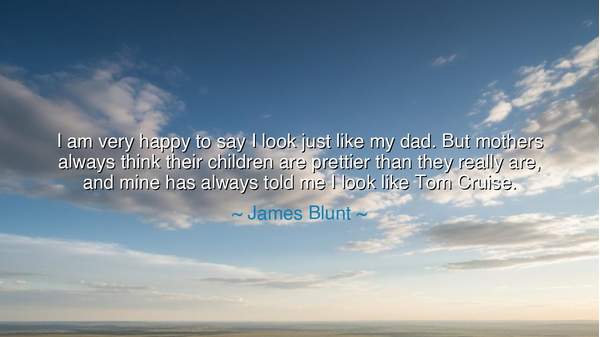
I am very happy to say I look just like my dad. But mothers
I am very happy to say I look just like my dad. But mothers always think their children are prettier than they really are, and mine has always told me I look like Tom Cruise.






Hearken, children of the ages yet to come, and attend to the gentle reflection of James Blunt, who once said: “I am very happy to say I look just like my dad. But mothers always think their children are prettier than they really are, and mine has always told me I look like Tom Cruise.” In this whimsical yet profound statement lies a meditation on identity, perception, and the enduring bonds between parent and child. It reminds us that who we are is both a gift inherited and a lens shaped by love.
Blunt’s acknowledgment that he resembles his father speaks to the ancient understanding of lineage and continuity. From time immemorial, children have been mirrors of their parents, reflecting not only physical traits but also character, courage, and spirit. To recognize oneself in the visage of a parent is to honor the thread of heritage, the invisible bond linking generations. The ancients celebrated such likeness, seeing in children the extension of their forebears’ virtues and dreams.
Yet Blunt tempers this acknowledgment with humor and warmth, noting the mother’s perception of beauty: she has always insisted he resembles Tom Cruise, the image of fame and allure. Here lies an eternal truth: parents often see their children through the prism of love and imagination, embellishing qualities and nurturing confidence. The ancients recognized that this perception is a sacred act, a shield and a blessing, encouraging the young to flourish even when the world may judge more harshly.
Consider the story of Alexander the Great, whose mother, Olympias, spoke constantly of his destined greatness, instilling in him a sense of purpose and self-worth that would propel him to conquest. Though some of her visions may have seemed exaggerated, her belief shaped Alexander’s courage and ambition. So too does Blunt’s mother, through her playful comparison to a celebrated figure, plant seeds of confidence and resilience. The lesson endures: love and perception can elevate the spirit, even if they embellish reality.
Blunt’s reflection also reveals the subtle interplay between self-perception and external influence. While he acknowledges his physical resemblance to his father, he also embraces the imaginative view of his mother, blending reality with affection. This duality teaches a timeless lesson: identity is not fixed but shaped by lineage, nurture, and the interpretations of those who care for us. True understanding of self requires both humility and gratitude, recognizing both inherited traits and the perceptions gifted by love.
In life, the ancients taught that humor and humility are necessary companions to wisdom. Blunt’s anecdote carries both—joy in recognizing his father’s features, and gentle laughter at the motherly exaggeration. Such balance is a guide for living: embrace reality, yet honor the imaginative, the tender, and the affectionate lenses through which we are seen. In doing so, one cultivates gratitude, confidence, and a heart attuned to human connection.
Practical guidance flows naturally from this reflection: cherish your heritage and the qualities you inherit, honor the love and perceptions of those who nurture you, and maintain humility in self-assessment. Recognize that praise and belief from those who care for you can be a source of strength, inspiration, and courage, even if it embellishes reality. Like Blunt, accept both inheritance and imagination with grace and joy.
Children of the ages, let this reflection remain in your hearts: your identity is woven from the threads of your ancestry and the love of those who watch over you. Celebrate your lineage, embrace the playful embellishments of affection, and carry forward both truth and imagination as guiding lights. For in this balance lies the joy of being seen, the wisdom of heritage, and the courage to step into the world fully, nurtured by love.
If you wish, I can also craft a more narrative, oral version, emphasizing the warmth, humor, and emotional resonance of parental perception, perfect for audio storytelling. Do you want me to do that?






AAdministratorAdministrator
Welcome, honored guests. Please leave a comment, we will respond soon